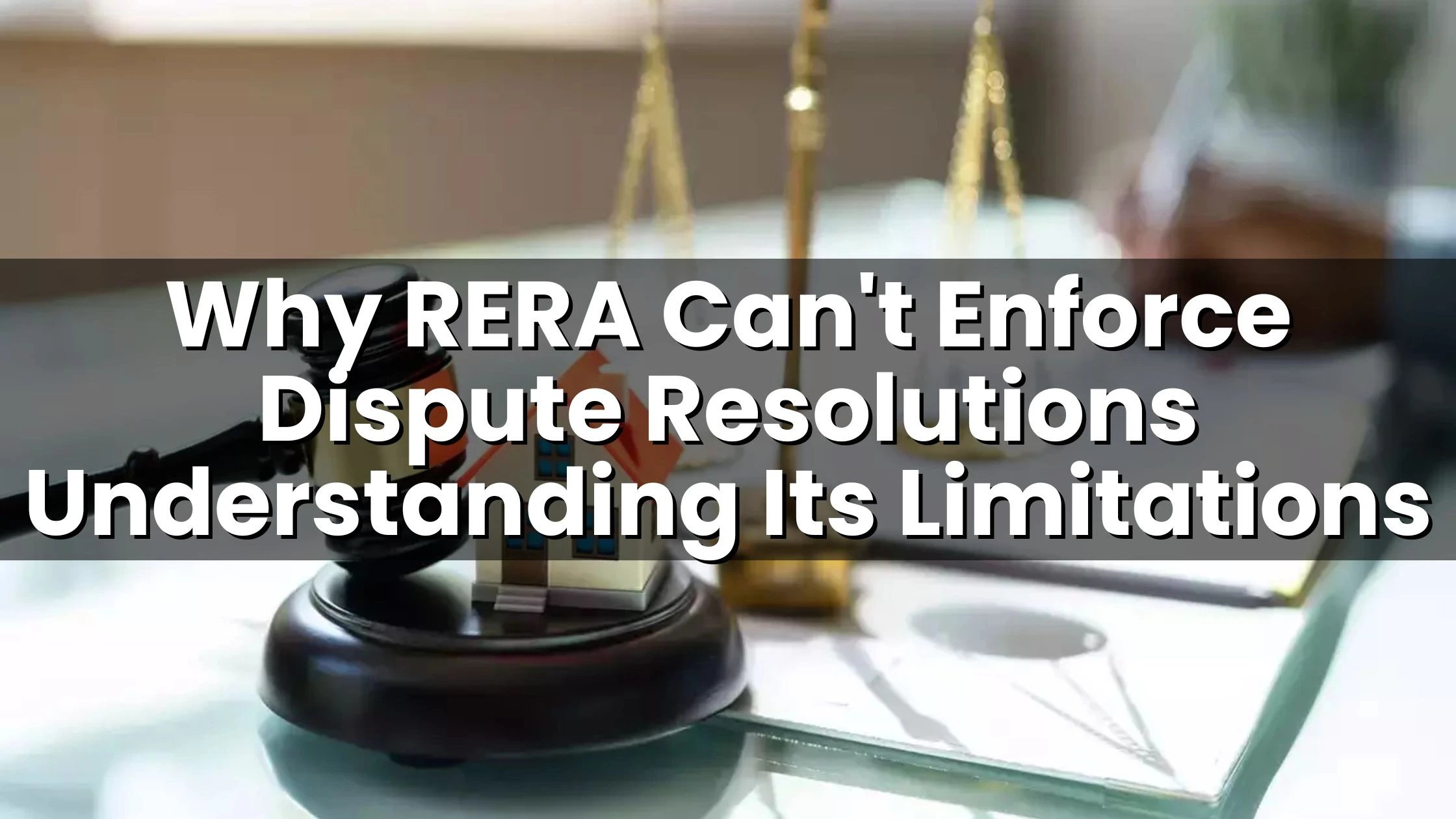Table of Content
▲
When it comes to buying a home, disputes between homebuyers and developers are not uncommon. The Real Estate Regulatory Authority (RERA) was created to help resolve these disputes fairly and transparently. However, a recent ruling by the Maharashtra Real Estate Appellate Tribunal has made it clear: RERA cannot force parties to settle disputes against their will. This decision came from a landmark case involving a flat buyer, Mr. Shekhar Singh, and a prominent city builder, and it has important lessons for both homebuyers and developers.
Background: The Case of Shekhar Singh vs. Keystone Realtors
In this notable case, Mr. Shekhar Singh purchased a flat in the Rustomji Seasons project, developed by Keystone Realtors, for ₹5.53 crore (excluding taxes). As per the sale agreement drawn up in 2018, the possession of the flat was to be handed over by December 31, 2019. However, delays in handing over the flat led to a dispute.
The issues escalated in July 2020 when the builder offered Singh possession of the ready flat and demanded an additional ₹70.81 lakh for various charges. Among these charges was a disputed demand of ₹3.54 lakh toward workers’ welfare cess. Singh contested this and further sought a deduction of ₹25.15 lakh as interest compensation for the delay. The builder, however, insisted on the full payment of the demanded amount.
Frustrated by the situation, Mr. Singh approached MahaRERA through his advocate, seeking compensation for the delay. On June 27, 2022, MahaRERA ruled that the developer had violated Section 18 of the RERA Act, 2016 by failing to hand over possession on time. Instead of granting full relief to Mr. Singh, the authority directed the parties to resolve the matter amicably within two months. Unsatisfied with this outcome, Mr. Singh appealed the decision to the RERA Appellate Tribunal.
Also Read: India's Real Estate Market to Double Its GDP Share to 15.5% by 2047
The Appellate Tribunal's Ruling
The appellate tribunal, composed of Shriram Jagtap and Shrikant Deshpande, examined the appeal carefully. The key points of their decision were:
- Voluntary Settlement Principle:
The tribunal ruled that RERA cannot force parties to settle disputes. This means that even if the authority suggests mediation, any settlement must be reached through mutual agreement rather than by coercion. - Rejection of Builder's Excuses:
The developer argued that the delay was due to pending permissions from government authorities and the impact of the Covid-19 pandemic. However, the tribunal rejected these arguments, noting that the possession date was well before the onset of the pandemic and that delays should not be excused by such factors. - Workers’ Welfare Cess Issue:
The tribunal also struck down the builder’s demand for a workers’ welfare cess of ₹3.54 lakh. They clarified that while the payment of such cess is a statutory obligation for the promoter, it was not explicitly mentioned in the sale agreement as the buyer’s responsibility. Thus, Mr. Singh was not obliged to pay this amount. - Compensation for Delay:
The tribunal directed the developer to compensate Mr. Singh for the delay. Specifically, they ruled that the developer must pay interest at around 10% (State Bank of India’s prevailing marginal cost lending rate + 2%) on an amount of ₹5.25 crore from January 1, 2020, to July 1, 2020. This decision underscored that homebuyers should not suffer financially due to delays on the part of the developer.
This ruling is a significant development in the real estate dispute resolution landscape. It reinforces the principle that RERA's role is to facilitate a fair process, not to enforce settlements that may not be mutually agreed upon.
Why This Ruling Matters
For Homebuyers
The decision is a major win for homebuyers. Here’s why:
- Enhanced Protection:
Homebuyers now have greater assurance that they won’t be forced into unfavorable settlements. This means if you decide to cancel a deal for valid reasons, you won’t be pressured into accepting excessive penalties. - Financial Security:
With the compensation for delay and limits on deductions, homebuyers like Mr. Singh are better protected against financial loss. This ruling ensures that any penalty or compensation is fair and justified. - Empowerment in Negotiations:
The ruling supports the idea that all parties have the right to negotiate terms freely. Homebuyers are empowered to stand their ground and demand fair treatment without being coerced by the regulatory process.
For Builders
For developers, this ruling also has important implications:
- Clear Guidelines:
Builders are now required to operate within a framework where any settlement reached must be mutually agreed upon. This means they must engage in honest and transparent negotiations, leading to a more trustworthy reputation in the market. - Accountability:
Developers can no longer rely on regulatory pressure to force a settlement. Instead, they must address delays and other issues responsibly, which can lead to improved customer satisfaction. - Reduced Litigation:
By encouraging voluntary settlement, the ruling may help reduce the number of disputes that escalate into lengthy legal battles. This not only saves time and money but also fosters a more collaborative environment in the real estate sector.
For the Real Estate Market
The broader impact of the ruling on the real estate market is significant:
- Increased Confidence:
A fair dispute resolution mechanism builds trust in the market, attracting both homebuyers and investors. Knowing that disputes will be handled transparently encourages more people to invest in property. - Promotion of Best Practices:
With a focus on voluntary settlements, both buyers and builders are likely to adopt more responsible practices. This shift can lead to a more stable and sustainable real estate market overall. - Balanced Growth:
The ruling helps create a level playing field where both parties have equal say in negotiations. This balance is crucial for the long-term growth and health of the real estate sector.
Practical Advice for Stakeholders
If you are a homebuyer or developer, consider these tips when facing a dispute:
1. Understand Your Rights:
Familiarize yourself with the RERA guidelines and the details of this ruling. Knowledge of your rights is the first step in protecting your interests.
2. Document Everything:
Keep detailed records of all transactions, communications, and agreements. Documentation is key in resolving disputes and ensuring that your case is strong if it goes to arbitration or court.
3. Use Mediation Effectively:
Engage in RERA’s mediation services but remember that any settlement must be voluntary. Don’t feel pressured to accept terms that do not work for you.
4. Seek Professional Help:
Consult legal experts or real estate advisors when in doubt. Professional guidance can help navigate complex situations and ensure that your rights are upheld.
5. Communicate Openly:
Whether you are negotiating as a buyer or a builder, maintain clear and honest communication. Address issues early to avoid misunderstandings and prolonged disputes.
Conclusion
The recent ruling by the Appellate Tribunal that RERA cannot force parties to settle disputes is a milestone for the real estate sector. In the case of Mr. Shekhar Singh and Keystone Realtors, the tribunal’s decision to reject forced settlements, strike down excessive penalty charges and mandate compensation for delays has set a strong precedent. This ruling ensures that homebuyers are not subjected to unfair financial penalties and that disputes are resolved through mutual agreement.
For homebuyers, this decision means greater protection and empowerment, ensuring that their rights are upheld even in challenging situations. For developers, it calls for more transparent and responsible business practices. Ultimately, this balanced approach to dispute resolution fosters a healthier, more sustainable real estate market, boosting investor confidence and paving the way for long-term growth.
Understanding this landmark case and its implications can help all stakeholders navigate property transactions with greater assurance and fairness. As the real estate market continues to evolve, such rulings are essential in promoting trust and stability, ensuring that both buyers and sellers benefit from a transparent and just system.
Also Read: MHADA Nashik Lottery Scheme 2025: Important Dates and Key Details






_1768985363.webp)


_1771582392.webp)
_1771577585.webp)
Ans 1. RERA facilitates fair and transparent dispute resolution between homebuyers and developers, ensuring compliance with the RERA Act, 2016.
Ans 2. No, RERA cannot enforce settlements. All resolutions must be mutually agreed upon by both parties.
Ans 3. The case highlighted that RERA cannot impose forced settlements and emphasized fair compensation for homebuyers in case of delays.
Ans 4. The developer was directed to pay interest at 10% on the delayed amount for a specific period and was barred from imposing unjust charges.
Ans 5. Homebuyers can file a complaint with RERA and seek compensation under Section 18 of the RERA Act for delays beyond the agreed possession date.
Ans 6. No, developers cannot impose charges like workers' welfare cess unless explicitly mentioned in the sale agreement.
Ans 7. It empowers homebuyers by ensuring fair compensation and preventing forced settlements, strengthening their rights in disputes.
Ans 8. Developers must ensure transparency, accountability, and adherence to sale agreements to avoid disputes and legal penalties.
Ans 9. It fosters trust, promotes fair practices, and encourages both homebuyers and developers to resolve disputes amicably.
Ans 10. Yes, mediation under RERA can be effective, but both parties must voluntarily agree to the settlement terms.